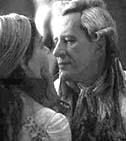
Movie Guru Rating:

Comment
on this review
| |

While interesting, Quills meanders in all of the wrong places
by Adrienne Martini
Context is everything. Without it, any given story has no background on which to unfold, no underlying set of cultural assumptions that inform the characters and their behavior. Set your movie in the present day and you can spend less time setting up the background; after all, you can reasonably assume that your audience has a pretty good idea of what the here and now is like since they are more or less here and now as well. Of course, context changes as the film ages—look at The Graduate or Carnal Knowledge. Movies that changed lives when they were first released now fail to have much of an impact.
Context, though, is doubly important when the story is set in a time and place that the audience isn't very familiar with—like, for instance, 18th century France. Against the backdrop of the revolution—where blood literally flowed through the streets—the Marquis de Sade makes a certain amount of sense, kind of like Larry Flynt does to us now. And Quills concerns itself with the last years of the Marquis' life, after he was committed to the Charenton Asylum, where he would smuggle his subversive works to his publisher by way of a laundress.
But Flynt's biopic did a much better job of placing him in his milieu, which is why it didn't play like a two-hour anti-censorship tract. Quills, while its theme is very similar to The People v. Larry Flynt, fails to make Sade more than a mouthpiece for its strident message about how unwholesome words and images are as important to be heard as the wholesome ones. And the Marquis de Sade's work was nothing if not unwholesome; remember, it is from him we get the word sadism.
Perhaps the best thing in Quills (and there are some very, very good things in it even though the movie doesn't resonate as much as it could) is Geoffrey Rush's turn as the Marquis. He is at his scenery-chewing best here, despite the fact that he spends the last third of the movie without the benefit of even having a costume. Part of his success stems from the fact that you can see him (both the actor and the character) in every scene, waiting for the perfect moment to strike.
And strike he does, accurately and frequently, making him a rather difficult character to like. Quills keeps trying to set him up as a hero, a champion for all who wish to speak their minds without fear of reprisal, but the Marquis' actions continually undercut the pedestal on which director Philip Kaufman tries to place him. That worked in Kaufman's Unbearable Lightness of Being, with Daniel Day-Lewis' philandering undercutting his character's essential decency. Here, though, the Marquis really doesn't have an essential decency, and it's Rush's deft work that continually keeps the character engaging.
Other performances are equally lush, like Kate Winslet's smart laundress. Here Winslet proves that she can hold her own with the best of them, like Rush and Michael Caine, who plays a duplicitous doctor sent in by Napoleon to force the Marquis to stop writing. Surprisingly, Joaquin Phoenix manages some depth with his portrayal of the well-intentioned priest who runs the asylum. He should really give up on trying to do a British accent, though.
During the moments that Quills concentrates on these actors and their characters, it shines brighter than the Marquis' razor-like wit. Unfortunately, writer Doug Wright keeps tossing in more characters in a misguided attempt to tell what feels like three different stories: the Marquis', Winslet's, and the doctor's. The focus keeps shifting, which diffuses the main thrust of Quills. Yet the one thing that keeps being hammered home is the importance of protecting all forms of expression, which isn't all that insightful, really.
That's not to say that the message isn't a noble one, just that it is focused on to the exclusion of things like setting up the context of the story. It's a surprise, really, that Kaufman can't quite wrap his directorial skills around Quills, given how similar it is to Lightness. Both have difficult protagonists. Both are set in historically significant times. Both grapple with love and lust and sex and all points in between. But Lightness didn't sacrifice character for theme and gave Kaufman time to explore what Prague must have felt like that spring when the Soviets rolled in, a luxury that he is not given in Quills. Here we are marched through the plot without any time to take a look at the scenery, which is a damn shame, given Kaufman's proven artistry.
Quills would have been a much better film had it been 45 minutes longer—a rare thing for any critic to say. But it feels too short in the same sort of way that the Grinch felt too long—in the latter there just wasn't enough story to justify its length, in the former, too much. It would have been rewarding to see what Kaufman could have done with the rich world the Marquis lived in, with the revolution, with the horror of the guillotine and how all of these constant threats helped shape a genius madman. Instead, what we get is a whirlwind of story and of hinted at context, which never quite satisfies.

December 21, 2000 * Vol. 10, No. 51
© 2000 Metro Pulse
|